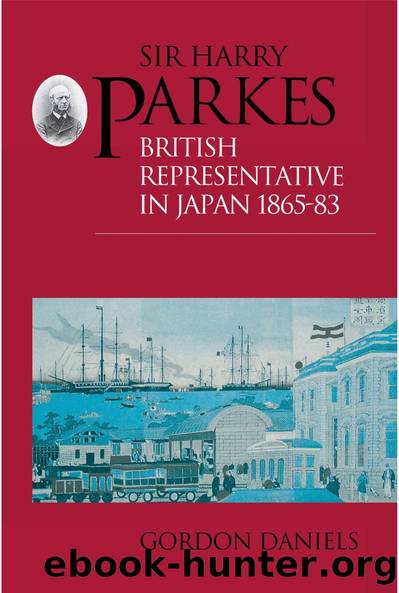Sir Harry Parkes by Gordon Daniels

Author:Gordon Daniels [Daniels, Gordon]
Language: eng
Format: epub
Tags: Social Science, Ethnic Studies, General, Regional Studies
ISBN: 9781134243341
Google: MTddAgAAQBAJ
Publisher: Routledge
Published: 2013-12-16T05:55:09+00:00
6
Home Away from Home
- 1871-73 -
SIR HARRY PARKES left Japan on 22 May 1871, and after crossing the Pacific, the American continent, and the Atlantic Ocean, arrived in England on 9 August. Unfortunately, no record of his thoughts or impressions during this long journey has survived. Even more unfortunate, there are no notes of his reactions to leading Americans whom he may have encountered in the United States. All that remains is a note by a friend that during the voyage to San Francisco 'in fair weather or fog' Parkes 'was always delighted to play a game of deck quoits or bull-board, throwing his whole heart into it with the warm enthusiasm and merry laughter of a schoolboy'.1
After docking in Liverpool Sir Harry travelled to Iford near Lewes to be reunited with his children who had remained in England when their mother returned to Japan in 1870. By October he was busy writing memoranda for the Foreign Office. Indeed, the chief interest of this period of over a year's leave in Britain lies in the evidence which it provides of Parkes' prestige and prowess as an East Asian expert, both in diplomatic circles and in the wider world of Parliament.
From Sussex, Sir Harry Parkes moved to Scotland for a holiday during which he indulged in his vigorous hobby of hill climbing. He finally returned to Ryde to spend the autumn.
From the many memoranda which Sir Harry composed during his stay in England it is clear that relaxation was always mixed with a great deal of hard work. These were eventful months in Japan and the Foreign Office trusted Parkes' judgement far more than that of his deputy, F.O. Adams, who was Chargé d'affaires in Tokyo. Every important policy issue was an occasion for detailed consultation, and all major decisions which involved no extra expenditure appear to have followed Parkes' advice.
Shortly before Parkes left Japan, Iwakura had asked him when the British garrison would be withdrawn from Yokohama. The Foreign Office was eager to know Parkes' estimate of the situation and whether concessions should be made to Japanese demands. There were always several factors to be weighed in judging this issue, and Parkes' view was characterized by his customary balance of concern for both immediate British interests and the long-term security of Japan. Sir Harry noted that the size of the British garrison had already been reduced, which provided evidence of British goodwill. This partial withdrawal also provided an opportunity to gauge Japanese reactions before considering further moves. Parkes had sufficient confidence in Iwakura to believe that the application would never have been made if the Japanese did not 'feel increasing confidence in the power of their new administration'.
Nevertheless, he wrote: 'Their ideas of protection are far from perfect and they are too apt to think that blood may be atoned for by an apology which is easily made.' Parkes pointed out that in February 1871 the Government had welcomed the presence of British troops on account of internal disturbances, and that France and the United States had supported the stationing of the British garrison.
Download
This site does not store any files on its server. We only index and link to content provided by other sites. Please contact the content providers to delete copyright contents if any and email us, we'll remove relevant links or contents immediately.
| China | India & South Asia |
| Japan |
Fanny Burney by Claire Harman(25801)
Empire of the Sikhs by Patwant Singh(22194)
Out of India by Michael Foss(16319)
Leonardo da Vinci by Walter Isaacson(11933)
Small Great Things by Jodi Picoult(6115)
The Six Wives Of Henry VIII (WOMEN IN HISTORY) by Fraser Antonia(4807)
The Wind in My Hair by Masih Alinejad(4434)
The Lonely City by Olivia Laing(4136)
The Crown by Robert Lacey(4122)
A Higher Loyalty: Truth, Lies, and Leadership by James Comey(4046)
The Iron Duke by The Iron Duke(3659)
Millionaire: The Philanderer, Gambler, and Duelist Who Invented Modern Finance by Janet Gleeson(3583)
Sticky Fingers by Joe Hagan(3462)
Alive: The Story of the Andes Survivors by Piers Paul Read(3326)
Papillon (English) by Henri Charrière(3285)
Joan of Arc by Mary Gordon(3275)
Stalin by Stephen Kotkin(3099)
Aleister Crowley: The Biography by Tobias Churton(3034)
Ants Among Elephants by Sujatha Gidla(2933)
